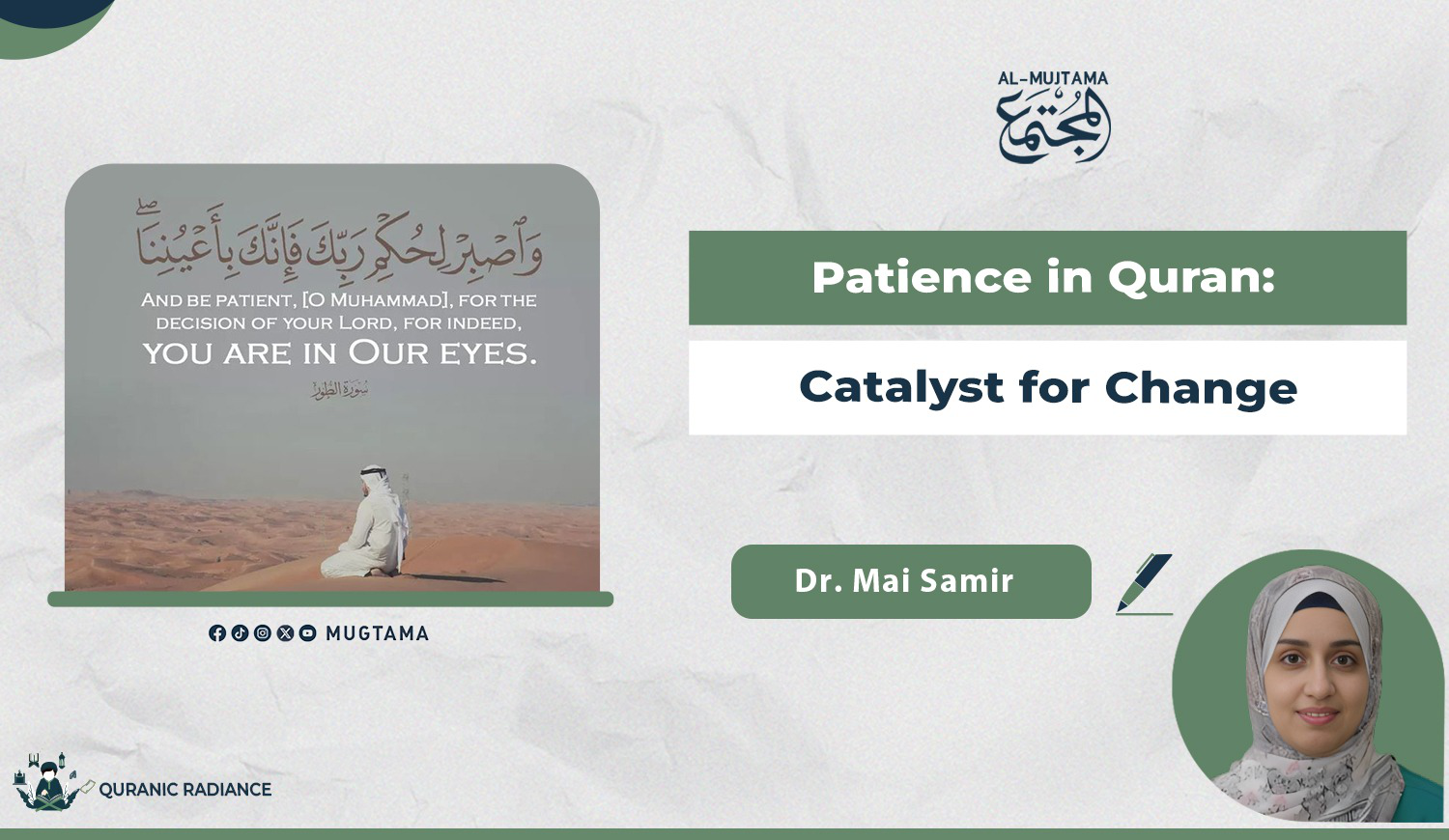Patience in the Quran: Catalyst for Change

Calls to patience often
proliferate during times of crisis, and with the escalation of the Ummah’s
ordeals, patience has become a universal demand. Speeches and writings abound
on the virtues of patience and endurance in the face of hardship and calamity striking us from every direction.
However, the common—or perhaps intentionally promoted—understanding of patience
has reduced it to a passive state synonymous with waiting, enduring, and
refraining from reaction. This view starkly contrasts with the understanding of
patience as revealed in the Quranic discourse.
Patience, in the scale of divine
revelation, holds a mighty value and an exalted rank. Yet it differs greatly
from the widespread notion of inactive patience that brings no change and
equates to silent observation of surrounding wrongs and inner sins.
True patience requires a correct understanding of its meaning and mechanisms,
to activate it within believers’ hearts in a way that fulfills the purpose of
revelation — which elevated patience and mentioned it extensively in the Quran.
The Meaning of Patience
When tracing the linguistic
definitions of patience, we find diverse meanings. The lowest level, however,
aligns with the Quranic perspective: restraining oneself at times of anxiety or
calamity, as Ibn Manzhur notes in Lisan Al-Arab.
“As-Sabur” (The Most Patient) is
one of the Most Beautiful Names of Allah, meaning that He does not hasten punishment
upon sinners. Ibn Manzur differentiates between the attribute of Allah Al-Haleem
(The Most Forbearing) and As-Sabur: under the latter, the sinner is not
safe from punishment as he might be under the former.
Quranic Ayahs on Patience
According to Imam Al-Ghazali in
his monumental work Ihya’ Ulum Ad-Din (The Revival of the Religious Sciences),
ayahs about patience exceed seventy in number. When counting the various
grammatical forms — the noun (Sabr), the verbs (Isbir, Istabr),
and the adjective (As-Sabirin) — the total exceeds ninety occurrences
in the Quran.
This high frequency underscores
the central role of patience in divine revelation. It is even said that
“patience is half of faith.” But how can patience become a productive,
faith-driven methodology that inspires action — contrary to today’s passive notion of patience?
The Quran presents patience as a
virtue linked to proactive deeds in every sphere of life — worship, morality,
and social dealings — making it an active and continuous force that drives
believers to act, interact, and transform their reality, not to withdraw or
stagnate.
Types of Patience and Their Roles in a Believer’s Life
1.
Patience in Worship
{And seek help
through patience and prayer.} [Al-Baqarah 2:44]
Patience and prayer are mentioned
together repeatedly in the Quran. Some scholars interpret patience here as
fasting, while others see it in its broader meaning — steadfastness in worship, especially prayer, the pillar of faith and the most vital
act after the testimony of faith.
Thus, patience becomes a
renewable spiritual energy that sustains devotion and consistency in obeying
divine commands. As Imam Ali (may Allah be pleased with him) said: “There is
no faith for one who has no patience.”
2.
Patience in Seeking Knowledge
{And how can you be
patient with what is beyond your ˹realm of˺ knowledge?} [Al-Kahf 18:68]
The Quranic guidance shows a deep
link between knowledge and patience. One who lacks understanding cannot endure
the demanding journey of learning. Islam equates the pursuit of knowledge with jihad in the cause of Allah, for it requires
enduring hardship and perseverance.
This was exemplified by Prophet
Musa (peace be upon him) when he learned from the righteous servant. Despite
not fully understanding the servant’s actions, Musa (peace be upon him)
remained patient — traveling, observing, and learning, even when he disagreed.
3.
Patience Against Sin
{And ˹they are˺ those who endure patiently, seeking
their Lord’s pleasure, establish prayer, donate from what We have provided
for them—secretly and
openly—and respond
to evil with good. It is they who will have the ultimate abode.} [Ar-Ra`d 13:22]
The Quranic discourse connects
patience in obedience with patience against disobedience in this ayah.
Resisting sinful desires and restraining oneself from wrongdoing purifies the
soul and prepares it for worship and closeness to Allah.
Patience as a Psychological Defense Mechanism
With this positive and active
understanding, patience becomes a vital psychological defense mechanism — both
individually and collectively — and a key to personal growth and success.
{We will certainly
test you with a touch of fear and famine and loss of property, life, and crops.
Give good news to those who patiently endure.} [Al-Baqarah 2:155]
This divine declaration shapes
patience as a means of resilience amid trials, strengthening individuals and
nations to seek progress rather than wait for a “savior” or a “miraculous
solution”, under false promises of passive patience.
By cultivating this spiritual
mechanism, one gains inner stability, mental strength, and emotional endurance.
It becomes the foundation for anyone striving for success — in education, work,
or life.
As this quality declines in our societies, especially among youth, we witness
the spread of emotional fragility, impatience, rising divorce rates, moral
decline, and other signs of social decay — all pointing to the erosion of patience as a sustaining virtue.
Patience as a Social Pillar
On a social level, patience
serves as a dynamic strategy that fortifies communities during wars and crises: {˹Yet,˺ if you are patient and mindful ˹of Allah˺, their schemes will not harm you in the least.} [Ali `Imran
3:120]
This value empowered the early
Muslims and Companions to endure harm, resist conspiracies, and persevere in
spreading the divine message until they established a vast, flourishing
civilization that illuminated the world.
Ultimately, patience in the
Quranic worldview is neither passive stillness nor withdrawal from action. It
is a living power that moves the believer toward worship, struggle, and
purposeful work.
It is a personal energy that
grants steadfastness, and a collective strength that builds civilizations.
Patience is the bridge by which the Ummah crosses from trial to revival — the
fuel that transforms hardship into opportunity and weakness into renewed
action.
For Further Reading:
- Why Do We Tolerate Wrongdoing?
- Book Review: “Diseases of the Hearts” By Sheikh Abdul Rahman Bin Muhammad Al-Masri
- Insights from the Story of Adam (peace be upon him)
-------------------------------------------------------------











